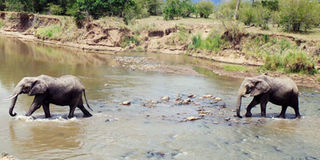Saving Mara River to avert water conflicts

Elephants crossing the Mara River. Photo/GEORGE SAYAGIE
What you need to know:
- Prompted by the potential for water conflicts that could arise from competition for the scarce water resource, communities living within the Mara Basin came together in 2003 and formed the Mara River Water Users Association (MRWUA).
- MRWUA has partnered with organisations such as the World Wide Fund for Nature (WWF), National Environmental Management Authority, Water Resources Management Authority and research organisations to realise its mission.
The importance of the Mara River to Kenya’s economy cannot be overemphasised.
Not only is it the venue for the annual wildebeest migration that attracts tourists from across the globe into the country, but its is also a source of water for wildlife in the surrounding Maasai Mara Game Reserve.
However, over the years, the quantity and quality of water in the Mara River has deteriorated due to poor land use practices, deforestation, human encroachment and climate change.
Prompted by the potential for water conflicts that could arise from competition for the scarce water resource, communities living within the Mara Basin came together in 2003 and formed the Mara River Water Users Association (MRWUA).
“We are creating awareness on conservation, reforestation, spring protection, water harvesting technologies and promoting energy saving technologies,” said Kennedy Onyango, the association’s manager.
MRWUA has partnered with organisations such as the World Wide Fund for Nature (WWF), National Environmental Management Authority, Water Resources Management Authority and research organisations to realise its mission.
WATER STRESS
According to WWF project manager Kevin Gichangi, poor farming methods, massive water abstraction and the move to venture into huge farming projects have played a role in the decline in water quality and quantity.
“Forest land has been turned into tea and wheat estates, which has adversely affected the rain pattern and water flow into the basin. We are encouraging farmers to adopt farming methods that support river bank protection and forest rehabilitation,” said Mr Gichangi.
Seif Hamisi of WWF lauded the association and called on the government to support its activities.
“In the past, the water levels in the Mara River were always high, but now there are high and low peaks. If the wanton destruction of the Mau Forest continues then we will soon be seeing the wildebeest walk across a dry river bed,” Mr Hamisi said.
Kenya and Tanzania have started wildlife and water conservation fora on the world-famous Maasai Mara Game Reserve and Serengeti National Park. Among the outcomes of these fora is the Mara Day, which aims at saving the Mara Basin ecosystem.
It is marked every September 15.
This story was first published in the East African





